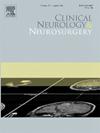Deep brain stimulation for refractory epilepsy: A meta-analysis of stimulation parameters
IF 1.8
4区 医学
Q3 CLINICAL NEUROLOGY
引用次数: 0
Abstract
Background
Epilepsy affects approximately 50 million people worldwide, with around 30 % not responding to antiepileptic drugs. Neuromodulation therapies, such as deep brain stimulation (DBS), are increasingly crucial for managing poorly controlled epilepsy.
Methods
This study conducted a meta-analysis following PRISMA guidelines, systematically searching PubMed, Scopus, and Web of Science databases for studies on DBS in refractory epilepsy patients. Out of an initial 568 papers screened by title and abstract, 49 studies met the inclusion criteria, involving a total of 682 patients.
Results
Various DBS interventions were analyzed, targeting regions such as the anterior nucleus of the thalamus, centromedian thalamic nucleus, and hypothalamus, with diverse stimulation parameters, including voltage, frequency, and stimulation type. The analysis revealed that these parameters significantly impacted treatment success, with moderate variability among studies.
Conclusions
This meta-analysis underscores the importance of tailored DBS parameters to improve outcomes in patients with drug-resistant epilepsy, highlighting DBS as a promising treatment approach.
脑深部刺激治疗难治性癫痫:刺激参数的荟萃分析
全球约有5000万人患有癫痫,其中约30% %对抗癫痫药物无效。神经调节疗法,如深部脑刺激(DBS),在治疗控制不佳的癫痫方面越来越重要。方法本研究按照PRISMA指南,系统检索PubMed、Scopus和Web of Science数据库,对难治性癫痫患者DBS的相关研究进行meta分析。在最初通过标题和摘要筛选的568篇论文中,49项研究符合纳入标准,共涉及682名患者。结果分析了不同的DBS干预措施,针对丘脑前核、丘脑中央核和下丘脑等区域,采用不同的刺激参数,包括电压、频率和刺激类型。分析显示,这些参数显著影响治疗成功,研究之间存在中度差异。该荟萃分析强调了定制DBS参数对改善耐药癫痫患者预后的重要性,强调了DBS是一种有前景的治疗方法。
本文章由计算机程序翻译,如有差异,请以英文原文为准。
求助全文
约1分钟内获得全文
求助全文
来源期刊

Clinical Neurology and Neurosurgery
医学-临床神经学
CiteScore
3.70
自引率
5.30%
发文量
358
审稿时长
46 days
期刊介绍:
Clinical Neurology and Neurosurgery is devoted to publishing papers and reports on the clinical aspects of neurology and neurosurgery. It is an international forum for papers of high scientific standard that are of interest to Neurologists and Neurosurgeons world-wide.
 求助内容:
求助内容: 应助结果提醒方式:
应助结果提醒方式:


